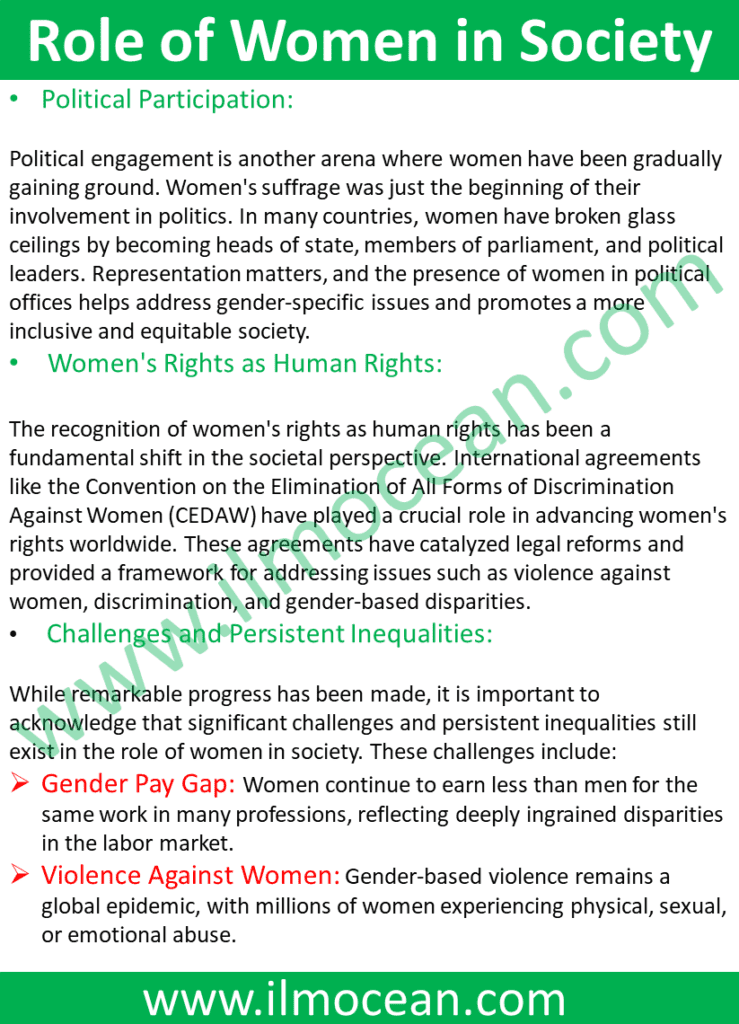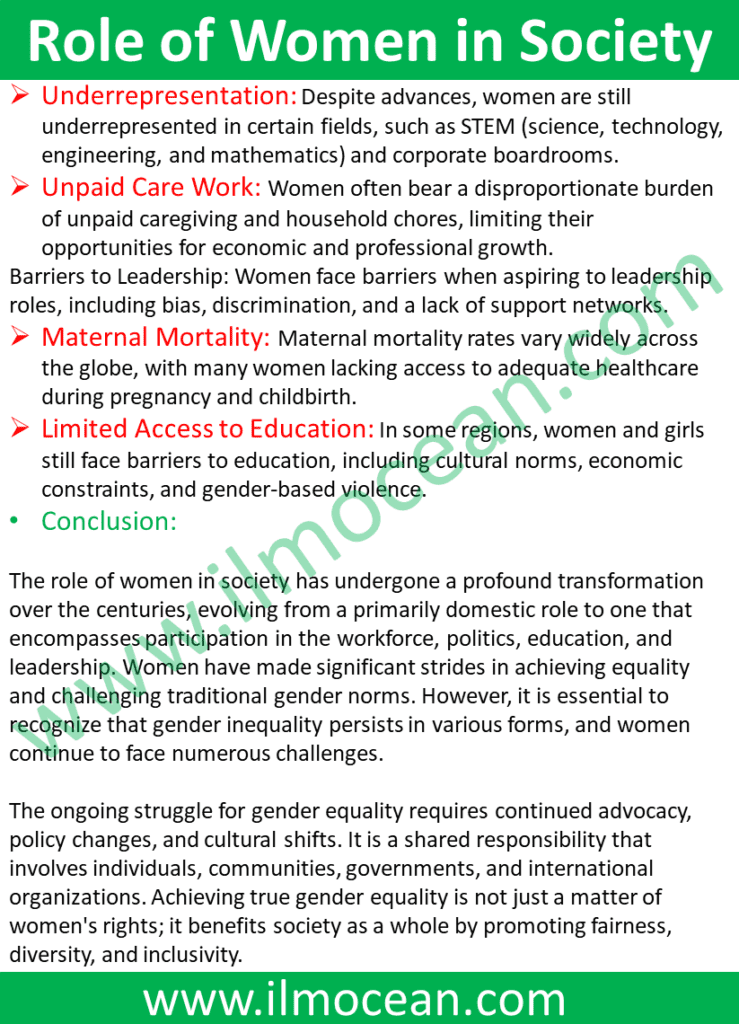The role of women in society has undergone a profound metamorphosis, transcending the boundaries of tradition and carving out new pathways of influence, opportunity, and empowerment. In the tapestry of human history, women have been both the weavers and the threads, their roles shifting from being relegated to domestic spheres to emerging as dynamic forces in diverse arenas. No longer confined by the narrow constraints of yesteryear, women have risen as educators, leaders, scientists, artists, and drivers of social change. This transformation reflects the relentless pursuit of gender equality, the dismantling of patriarchal structures, and the recognition of women’s rights as human rights. Yet, amidst this progress, challenges persist, manifesting as gender disparities in pay, violence, and representation. This essay delves into the multifaceted journey of women in society, celebrating their triumphs and acknowledging the ongoing battle for a more equitable and inclusive world.
Download free PDF at the bottom of lesson
-
Introduction:
The role of women in society has undergone significant transformations throughout history, reflecting the shifting dynamics of culture, economics, and politics. For centuries, women were relegated to traditional domestic roles, their contributions limited to caregiving, homemaking, and child-rearing. However, as societies evolved, so did women’s roles. In this essay, we will explore the multifaceted role of women in contemporary society, emphasizing the strides made toward gender equality, while acknowledging the persistent challenges and inequalities that persist.
The Changing Landscape: Women’s Roles in Society
- Historical Perspective:
To understand the current role of women in society, we must first examine the historical context in which it has developed. Throughout most of recorded history, women’s roles were largely confined to the home and family. In agricultural societies, women often worked alongside men in farming and household tasks but had little access to formal education or economic independence. In many cases, women were regarded as property or second-class citizens, lacking the right to vote, own property, or participate in political life.
- The Women’s Suffrage Movement:
The late 19th and early 20th centuries marked a pivotal period in women’s history—the women’s suffrage movement. This movement fought tirelessly for women’s right to vote, recognizing that political participation was a critical step towards gender equality. In 1920, the 19th Amendment to the United States Constitution was ratified, granting American women the right to vote. Similar movements occurred worldwide, leading to gradual progress in recognizing women’s rights as human rights.
- Economic Empowerment:
One of the most significant transformations in the role of women in society has been their increasing economic empowerment. As industrialization and urbanization swept the globe, women began to enter the workforce in greater numbers, initially in low-paying and often exploitative jobs. Over time, women’s participation in the labor market expanded, and gender norms surrounding employment shifted.
In the mid-20th century, the feminist movement gained momentum, advocating for equal pay and equal opportunities in the workplace. While significant progress has been made, the gender pay gap still exists in many parts of the world, reflecting the ongoing challenges women face in achieving economic parity with men.
- Education and Professional Advancement:
Access to education has been a crucial driver of women’s progress in society. In the past, educational opportunities for women were limited, perpetuating gender disparities in various fields. However, over the last century, women have made tremendous strides in education. Today, women are as likely as men to enroll in higher education and pursue careers in a wide range of fields, from science and technology to business and politics.
The increasing presence of women in leadership positions across various sectors is a testament to their professional advancement. Women now hold key roles in governments, corporations, academia, and non-profit organizations, contributing their expertise and insights to decision-making processes.
- Political Participation:
Political engagement is another arena where women have been gradually gaining ground. Women’s suffrage was just the beginning of their involvement in politics. In many countries, women have broken glass ceilings by becoming heads of state, members of parliament, and political leaders. Representation matters, and the presence of women in political offices helps address gender-specific issues and promotes a more inclusive and equitable society.
- Women’s Rights as Human Rights:
The recognition of women’s rights as human rights has been a fundamental shift in the societal perspective. International agreements like the Convention on the Elimination of All Forms of Discrimination Against Women (CEDAW) have played a crucial role in advancing women’s rights worldwide. These agreements have catalyzed legal reforms and provided a framework for addressing issues such as violence against women, discrimination, and gender-based disparities.
- Challenges and Persistent Inequalities:
While remarkable progress has been made, it is important to acknowledge that significant challenges and persistent inequalities still exist in the role of women in society. These challenges include:
- Gender Pay Gap: Women continue to earn less than men for the same work in many professions, reflecting deeply ingrained disparities in the labor market.
- Violence Against Women: Gender-based violence remains a global epidemic, with millions of women experiencing physical, sexual, or emotional abuse.
- Underrepresentation: Despite advances, women are still underrepresented in certain fields, such as STEM (science, technology, engineering, and mathematics) and corporate boardrooms.
- Unpaid Care Work: Women often bear a disproportionate burden of unpaid caregiving and household chores, limiting their opportunities for economic and professional growth.
- Barriers to Leadership: Women face barriers when aspiring to leadership roles, including bias, discrimination, and a lack of support networks.
- Maternal Mortality: Maternal mortality rates vary widely across the globe, with many women lacking access to adequate healthcare during pregnancy and childbirth.
- Limited Access to Education: In some regions, women and girls still face barriers to education, including cultural norms, economic constraints, and gender-based violence.
- Conclusion:
The role of women in society has undergone a profound transformation over the centuries, evolving from a primarily domestic role to one that encompasses participation in the workforce, politics, education, and leadership. Women have made significant strides in achieving equality and challenging traditional gender norms. However, it is essential to recognize that gender inequality persists in various forms, and women continue to face numerous challenges.
The ongoing struggle for gender equality requires continued advocacy, policy changes, and cultural shifts. It is a shared responsibility that involves individuals, communities, governments, and international organizations. Achieving true gender equality is not just a matter of women’s rights; it benefits society as a whole by promoting fairness, diversity, and inclusivity.
In the pursuit of a more equitable future, societies must prioritize the elimination of gender-based discrimination, the empowerment of women economically and politically, and the promotion of equal opportunities for all, regardless of gender. Only by addressing the challenges and inequalities that persist can we fully harness the potential and contributions of women in society.

